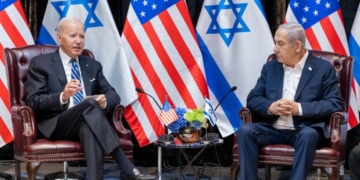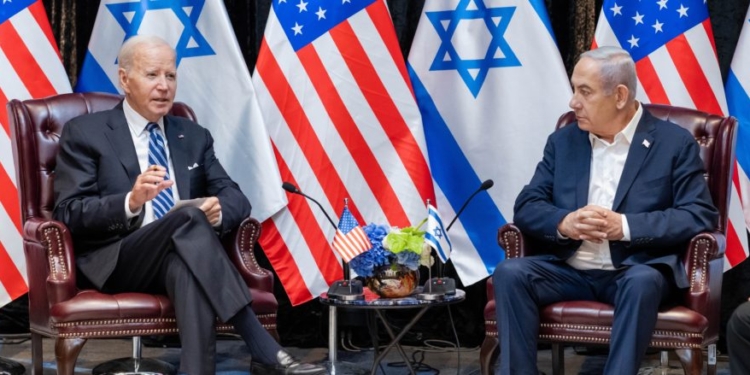President Joe Biden asked Israel to make further concessions on a possible ceasefire deal after Hamas refused the current terms on Sunday, Axios reported.
Hamas refused a proposed ceasefire agreement with Israel on Sunday — as it had several times before — arguing that Israeli Prime Minister Benjamin Netanyahu had set “new conditions” for a deal, including that Israeli forces remain along the Gazan-Egyptian border, according to The Times of Israel. Biden called Netanyahu on Wednesday and urged him to loosen his demand that Israeli forces remain along the border so that a deal can be secured, U.S. officials told Axios.
Israel’s goal in keeping forces along that border would be to prevent the smuggling of weapons to Hamas from Egypt, according to Axios. Netanyahu told U.S. Secretary of State Antony Blinken on Monday that keeping forces along the border was a necessity for a deal.
Prime Minister Benjamin Netanyahu is holding a private meeting at the Prime Minister’s Office in Jerusalem, with US Secretary of State Antony Blinken.https://t.co/SIIMPvHBY1 pic.twitter.com/NGUqU4QTod
— Prime Minister of Israel (@IsraeliPM) August 19, 2024
The demand has proved contentious in the ongoing negotiations, which have evolved over months. An Israeli team recently presented a map depicting their forces remaining along the border to Egypt; the Egyptians rejected the proposal, according to Axios.
Israeli Defense Minister Yoav Gallant and his team believe that forces can be pulled away from the border, warning Netanyahu that keeping them there could endanger a possible ceasefire agreement and hostage release deal, Israeli officials told Axios. Gallant and Netanyahu have been at odds over the war and its ending in recent weeks, sometimes bringing their disagreements into the public eye.
A ceasefire between Israel and Hamas has been a longtime goal of the U.S. and Arab players in the Middle East, although reaching a deal has been difficult as neither side has been able to agree on terms. Protests have broken out across Israel over recent months, with people demanding that Netanyahu do more to secure a deal.
Negotiators from the U.S. and Israel, alongside other Arab partners, met in Qatar for talks last week, though representatives for Hamas were not present; talks are continuing in Egypt this week. Blinken said on Monday that it might be “probably the best, maybe the last, opportunity” to reach a deal.
Behind closed doors, U.S. and Israeli officials have become concerned that a deal may soon be out of reach, according to Politico. Complicating matters, there’s no clear alternative to the current proposal if it does not work.
Should the conflict continue, it could raise the risk that other actors in the region — such as Iran — launch an attack against Israel, according to Politico.
“We don’t know if [Hamas leader Yahya] Sinwar wants this deal,” one of the officials familiar with Israel’s stance in the negotiations told Politico. “But if we don’t get the deal there’s a chance that Iran attacks and this escalates into a full-blown confrontation.”
All content created by the Daily Caller News Foundation, an independent and nonpartisan newswire service, is available without charge to any legitimate news publisher that can provide a large audience. All republished articles must include our logo, our reporter’s byline and their DCNF affiliation. For any questions about our guidelines or partnering with us, please contact [email protected].



























 Continue with Google
Continue with Google